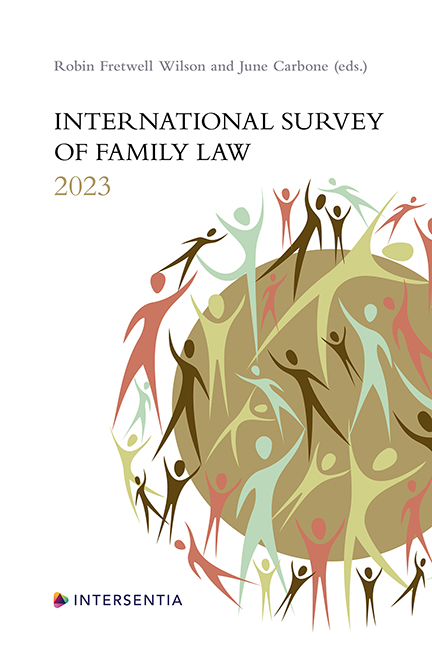Brazil The Family Among the Cohabitation Modalities of the Law and the Distinction between Being, Thinking, Acting and Feeling as a Family
Published online by Cambridge University Press: 03 April 2024
Summary
Résumé
Le présent article expose les perceptions sociologiques, philosophiques, anthropologiques et juridico-constitutionnelles brésiliennes de la famille, afin de permettre la compréhension des observations structurelles qui favorisent l’identification d’une entité comme pouvant être considérée comme une famille par le droit. Il est entendu que l’extension du concept juridique de famille, sans critères objectifs et sans limites, conduit, à proprement parler, à la perte de la compréhension de ses caractéristiques, de ce qui la différencient d’autres groupes et associations de nature « cohabitationnelle ». Ces dernieres doivent recevoir un traitement juridique différent, quoique comparable à celui de la famille.
INTRODUCTION
The present chapter aims to share sociological, philosophical, anthropological and Brazilian juridical-constitutional views about the family that can help in the reflection on objective observations that enable the legal recognition of an entity such as a family (in relation to being), in the face of the view that the presence of subjective elements such as the imagined family (in relation to thinking), the functional family (in relation to action), or the perceived family (in relation to feeling) are sufficient. It is understood that the extension of the legal concept of family without the consideration of structural or objective considerations, from a social and philosophical perspective, would lead, strictly speaking, to the emptying of the concept itself, covering up attributes that would differentiate it objectively, sociologically and philosophically, from groupings and associations of a similar nature that would justify different legal treatment.
A SOCIOLOGICAL PERSPECTIVE OF THE FAMILY
This chapter will maintain that the sociological view of the family provides a foundation for rethinking the legal definitions of what constitutes and what does not constitute a family. Critical to this foundation is a view of society grounded in ‘relational realities’ that prepare individuals, from birth forward, to function within a web of relationships that connect individuals to each other. This relational concept draws heavily on the work of Pierpaolo Donati, specifically The family as the root of society. Donati, a sociologist and professor at the University of Bologna, published this work in Spanish in 2013. 1 The book presents the family as a ‘relational reality’ that serves as the basis and root for all other social relations, because, in the family, the individual is primarily prepared for sociability.
- Type
- Chapter
- Information
- International Survey of Family Law 2023 , pp. 201 - 224Publisher: IntersentiaPrint publication year: 2023

